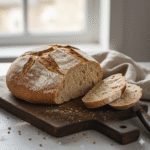Whole Grain Sourdough Bread
Yields: 1 medium loaf
Prep Time: 30 min (active) + bulk fermentation 4–6 hr + final proof 2–3 hr
Baking Time: 40–45 min
Servings 10 slices
Calories 140kcal
Ingredients
- 300 g whole wheat flour
- 100 g rye flour optional, adds depth
- 100 g rolled oats or oat flour optional, adds texture
- 350 –375g water adjust depending on flour absorbency
- 100 g active sourdough starter 100% hydration
- 10 g salt
Instructions
Mix the dough
- In a large bowl, combine the flours and water. Stir until no dry bits remain. Cover and let rest for 30 minutes (autolyse).
- Add starter and salt
- Mix in the sourdough starter and salt until fully incorporated. Dough will feel stickier and heavier than all-white flour dough—this is normal.
Bulk fermentation
- Cover and let the dough rise at room temperature for 4–6 hours, performing stretch-and-folds every 30–60 minutes for the first 2–3 hours. Whole grain dough ferments slower and is heavier, so patience is key.
Shape the dough
- Lightly flour your surface and gently shape the dough into a round or oval loaf. Avoid overworking; whole grain dough is more delicate.
Final proof
- Place the shaped dough in a floured banneton or bowl. Cover and let rise 2–3 hours at room temperature, or overnight in the fridge for a more developed flavor.
Preheat oven
- Preheat your oven to 450°F (230°C) with a Dutch oven inside if using.
Score and bake
- Carefully transfer the dough to the preheated Dutch oven. Score the top with a sharp knife or razor. Bake covered for 20–25 minutes, then uncover and bake another 15–20 minutes until deeply browned.
Cool
- Remove from the oven and let cool completely on a wire rack before slicing. Whole grain bread needs extra time to finish setting—resist the urge to cut too early.
Notes
Tips for Whole Grain Baking
Whole grain dough absorbs more water—don’t be afraid to adjust hydration.
Expect a denser, chewier crumb than white sourdough.
Using a mix of grains (like rye, spelt, or oats) adds complex flavor and texture.
A longer cold proof develops better flavor and makes slicing easier.
